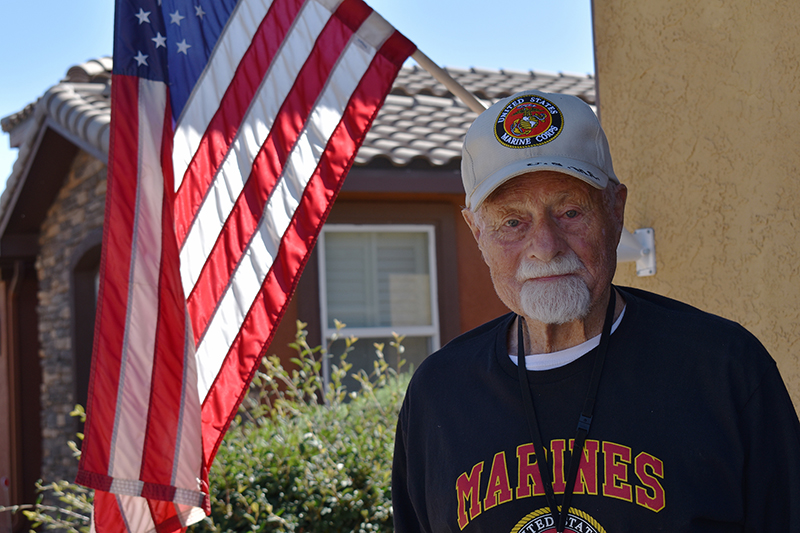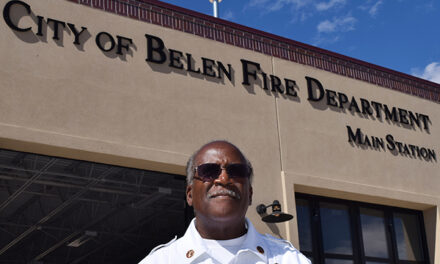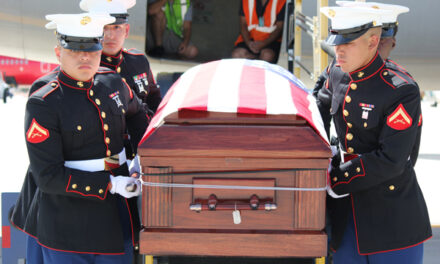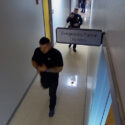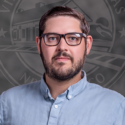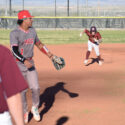Makayla Grijalva | News-Bulletin photo
World War II veteran Bill Grossman lives in Jubilee, an active senior community on the west side of Los Lunas. Grossman also served in the Korean Conflict and remembers the time when he participated in a special test project for the atomic bomb.
LOS LUNAS — “All you need to do to end a war is tell them that Grossman’s coming,” laughed 95-year-old Marine Corps veteran Bill Grossman.
Grossman enlisted in the United States Marine Corps at age 17 in 1945, right at the tail-end of World War II.
“You went in there as a wise-guy and you came out as a Marine,” Grossman said of his basic training in Parris Island, S.C. “They told you that you were one of the best fighting men in the world, and being 17 or 18 years old, you believed that. I had no fear at all.”
World War II
After he completed basic training, Grossman’s first deployment took him to Iwo Jima, Japan, where he was tasked to help secure the area.
“The major fighting was over and they were going up into the area using flamethrowers in the caves,” Grossman said. “My job was to guard the Marine who threw the flamethrowers.”
Although he never saw active conflict, Grossman said Japanese snipers were still targeting the American military, specifically during his time in Iwo Jima.
“One day I was walking around with a buddy of mine and boom, he fell over. He got shot right between the eyes,” Grossman said about the fateful day while on security detail. “And the sniper guy — well I got the sniper. It was just lucky that the sniper didn’t choose me as his target instead of my friend.”
Shortly after losing his partner, Grossman received new orders.
While atomic bombs were being dropped on the cities of Hiroshima and Nagasaki, killing more than 100,000 people, Grossman sat in waiting aboard a ship in the middle of the Pacific Ocean, prepared to be a part of the movement to invade Japan.
“There was a whole armada. If you looked around, 360 degrees, all you saw was ships going to go and invade Japan,” the veteran said. “I knew what boat team I was on — boat team 1-1 — the first boat in the first wave. I had no fear. I was ready to go.”
Grossman said no one informed his company about the atomic bomb, or why the invasion of Japan was called off. The armada just sat in the ocean for a few days before taking the marines and soldiers aboard their decks to a tent camp in Guam.
“We didn’t even see or know about the bomb. We were ready to go and invade,” Grossman said. “I learned years later when I was watching a television show with my two sons and they said how many American soldiers and Marines would perish during the invasion of Japan. It dawned on me that I would have never gotten to shore.”
After the end of the war, Grossman and his company received orders to serve on guard duty in Japan when an officer came through camp asking if anyone could type. Grossman stepped forward, and while his company made their way to Japan, he made his way back to Chicago, Ill.
Grossman, now ranking as a corporal, was stationed at a Marine Corps Separation Center at the Great Lakes Naval Training Center, where he was doing clerical type work, such as writing discharges. Soon, he was also offered a discharge if he signed up for the inactive reserve.
The Korean Conflict
While in the inactive reserve, Grossman attended and graduated from college on the GI Bill and married his high school sweetheart, Alice Morgan.
“I knew her well. We went to grade school together and went all the way through high school. We started dating as juniors in high school,” Grossman said. “When I joined the Marine Corps, she went into nurse training and, by the time I got out of the corps, she was a nurse.”
About two months after starting a career at General Electric, Grossman received a phone call from his mother telling him he received a wire calling him back in for extended active duty in the Korean Conflict.
During his time serving at this point, Grossman was using the skills he learned in college to teach officers about computers. A cease fire was called just a few months later on July 27, 1953.
“At the end of the Korean War, I told everybody, ‘All you need to do to end a war is tell them that Grossman’s coming, because the same happened with the Japanese,’” Grossman said with a laugh. “They were going to put me on a draft to Korea, but they kept delaying that because I had a wife and a son by then.”
The Cold War
Following the Korean Conflict, Grossman went back to work at General Electric, not wanting to continue his military career in order to be present for his family. Instead he signed up for the Civil Defense Corps, where he ranked as colonel.
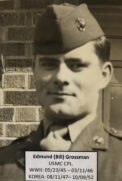
William Grossman
While actively participating in the corps, Grossman said the governor of Ohio gave him a call, asking if he could take a long weekend to participate in a special test project in the desert outside Las Vegas, Nev. The long weekend turned into a 10-day assignment.
The U.S. government was testing the survivability of an atomic bomb drop on civilians, one of which was Grossman.
“The theory was to prove that if you weren’t at ground zero, you could survive an atom bomb test by just being 4 feet down in a trench,” Grossman said. “They weren’t sure, but they thought it would be true.”
Eight to 10 civilians were chosen from his group to participate in the test. Every night at around 11 p.m., the participants were driven to a trench about a quarter-mile away from the detonation point.
“While we were in the trench, it was nice,” Grossman remembers. “They gave us coffee and doughnuts and, at the time, a USA Today (reporter) was a fella named Dave Carraway. He came and interviewed each of us separately while we were in the trench.”
Most days the group stayed there until the early morning hours until they received the announcement the blast was delayed 24-hours due to unfavorable weather conditions. Then one day, the weather delay never came.
“When it went off, you had to kneel down, close your eyes and the first thing you noticed was really bright light coming up from the ground to your eyes, even though they were closed,” Grossman said. “And then you got thrown away from the blast. A few seconds later, you got thrown the other way from the backlash.”
Provided with Geiger counters, the group had to immediately evacuate the trench after feeling the backlash of the blast in order to avoid becoming contaminated with radiation.
“So when we came out of the trench, the fireball was right there — right above you,” he said. “It burned my forehead and my forearms, but that is all. I didn’t get any radiation.”
Today, Grossman is living in the Jubilee, an active senior community on the westside of Los Lunas. While much of the memories he has gathered throughout the years of serving in the U.S. Marine Corps, working for General Electric, and raising his three boys with his wife is now in storage, he will still share his wealth of stories to anyone willing to listen.
Makayla Grijalva was born and raised in Las Cruces. She is a 2020 graduate of The University of New Mexico, where she studied multimedia journalism, political science and history.
